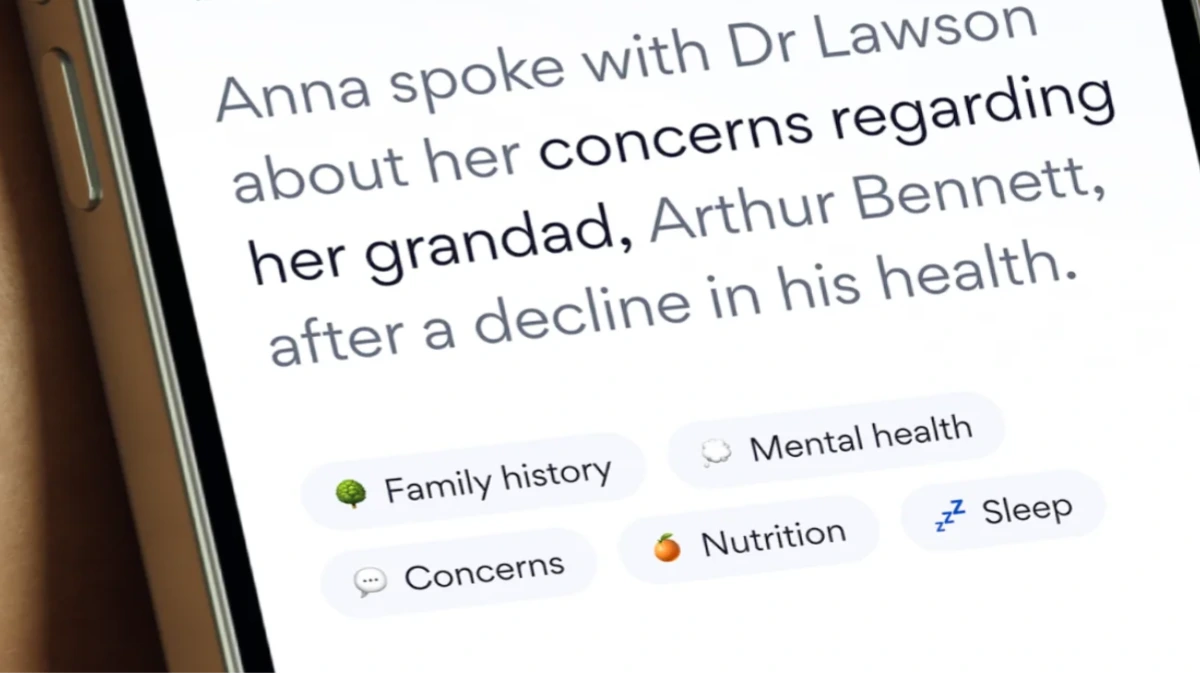OXFORD, England (TECHY QUANTUM) — A new artificial intelligence (AI) tool designed to help patients remember and understand details from their medical consultations has officially launched.
The app, called Mirror, records conversations between doctors and patients, then generates a structured summary that can be reviewed later or shared with family members and caregivers.
Developed by Oxford based Aide Health, the Mirror app is among a growing wave of AI innovations aimed at addressing information retention challenges in healthcare.
The platform seeks to minimize confusion and ensure patients retain essential details from often complex and fast paced medical discussions.
The inspiration for the Mirror app came from Aide Health founder Ian Wharton, who created the tool to support his father, diagnosed with early stage Alzheimer’s disease.
“It was the vast majority of information that was given to him that he just couldn’t recall, and my biggest fear was not being by his bedside when he was told something important,” Wharton said.
“They’re moments of quite often intense information, which are very brief for you to digest often high stakes news.”
The Mirror app uses AI driven speech recognition and natural language processing to generate detailed summaries from in person medical appointments.
Patients can later access these summaries through the app, helping them recall diagnoses, treatment plans, and follow-up steps.
Wharton described the platform as “a really modern application of AI to solve a hidden risk in every healthcare consultation that we have.”
Experts say the introduction of AI into clinical communication could represent a breakthrough for patient engagement and medical accuracy.
Dr. Harriet Linton, a digital health researcher at King’s College London, said the technology has potential to address a longstanding issue in healthcare.
“Research shows that patients typically forget between 40 to 80 percent of medical information shared during appointments,” Linton said.
“An AI system that captures, organizes, and summarizes key points could be transformative, especially for patients with chronic conditions or memory impairments.”
She added that ethical considerations, such as privacy and consent, must remain central as such tools become more common. “Transparency about how patient data is stored and used will be critical in building public trust.”
According to Aide Health, recordings are encrypted, and data ownership remains with the patient. “We don’t do anything with it we don’t sell it, we don’t give it to third parties,” Wharton said.
The launch of the Mirror app comes amid a surge in AI health technology adoption across the United Kingdom and Europe.
According to a 2025 report by Digital Health UK, nearly 60 percent of healthcare providers have begun integrating AI based tools to improve patient outcomes, communication, or administrative efficiency.
Comparatively, memory-assistance tools for medical communication remain rare. While some hospitals use transcription services or provide written summaries, these often lack personalization and accuracy.
Mirror’s real time summarization, developers claim, bridges that gap by offering tailored, context specific insights after each consultation.
A similar US based platform, Hippocratic AI, is piloting conversational medical assistants designed to summarize patient visits, but most tools remain in early stages of clinical validation.
Mirror, however, has already been deployed in several National Health Service (NHS) facilities as part of a limited rollout. For patients, the experience has been both surprising and reassuring.
Janette Alfrey, one of the first users of the app, said she was “quite stunned” by the accuracy of her consultation summary.
“It had given me a heading as to why I was there, and then it had talked about what was about to happen, why they were doing it, and what was going to happen when they did the next operation,” Alfrey said.
“When friends and colleagues phoned asking what was going to happen, I could just send them a screenshot of what I was told. It saved me from having to go through everything again.”
Healthcare professionals are cautiously optimistic. Dr. Peter Mendez, a consultant at Oxford University Hospitals NHS Foundation Trust, said the app could “lighten the cognitive load” for both patients and clinicians.
“We give patients a huge amount of information in a short span of time,” Mendez said. “Having a trustworthy, AI generated summary could reduce misunderstandings and improve compliance with treatment recommendations.”
The current version of Mirror is limited to in person consultations, but Aide Health plans to expand its functionality.
Future updates will integrate voice interactivity and patient prompts, allowing the AI to “advocate” on behalf of users during appointments.
“Right now our app is passive it listens and summarizes for you but in the future it will be your advocate,” Wharton said. “It will speak up if it thinks there’s something you should ask.
That’s where this technology is going, and this is absolutely where we’re going in how we manage our health.”
Industry analysts believe tools like Mirror could play a growing role in personalized medicine, where patient data is used to tailor care and improve outcomes.
However, they caution that broader adoption will depend on strong regulatory frameworks and ongoing clinical validation.
The Mirror app marks an important step toward merging AI with patient care, offering new ways to improve communication and memory retention during medical visits.
While still in its early stages, the platform highlights how technology can empower patients to take greater control of their health information.
As AI continues to evolve, the question for the healthcare sector will not be whether such tools are useful but how to ensure they are safe, equitable, and trusted by those who need them most.
